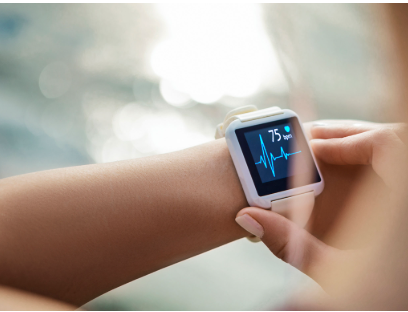Wearable health monitors devices are defined as tools designed to track and record a patient’s health information. The sensors in smartphones, watches other wearable health monitor devices can be continuously monitor walking habits. It provide an accurate measure of the patient’s gait. Wearable health monitor technology, mainly smartwatches, is a huge industry worth billions of dollars. This is a strong focus on health tracking.
Wearable technology in healthcare defines as devices that patients attach to their bodies to collect health and fitness data. They can share this data with their doctors. Continuous glucose monitors, smartwatches with advanced health metrics these all innovations are changing healthcare for the better

Many high-end devices claim to accurately monitor exercise, body temperature, heart rate, menstrual cycles, and sleep patterns. Right now the benefits of health monitoring through wearables are disproportionately available to consumer technology companies. Wearable health monitors enable remote monitoring of patients are allowing healthcare to keep the track of many patients.
Health Secretary Wes Streeting has suggested giving wearable devices to millions of NHS patients in England. This would help them track symptoms, such as side effects from cancer treatments, from home
However, many doctors and tech experts are still unsure about relying on health data from wearables. I’m currently testing a smart ring from the company Ultrahuman, and it seemed to know I was getting sick before I did.
How Wearable Health Monitors Are Changing Healthcare: Benefits, Challenges, and Future Trends
One weekend, it alerted me that my temperature was slightly high and my sleep was restless. It warned that this could be a sign of illness.
I brushed it off, thinking it might be due to perimenopause, and ignored it. But two days later, I was in bed with gastric flu.
I didn’t need to see a doctor, but if I had, would the data from my wearable have helped with my treatment? Many wearable brands believe it can.
For example, the Oura smart ring allows users to download a report of their health data and share it with their doctor.
Fitbit, Embr Labs, identifyHer, Esper Bionics, Cala Health, Wearable X, Apple, Dexcom, Rods&Cones & Oura are our Top 10 wearable healthcares.
Dr. Jake Deutsch, a doctor in the US who also advises Oura, says wearable data helps him “assess overall health more accurately.” But not all doctors agree that it’s always useful.
Dr. Helen Salisbury, a GP in Oxford, says she doesn’t see many patients bringing in data from their wearables, but it is becoming more common—and it worries her.
“I think wearables are helpful sometimes, but often they are not very useful,” she says. “I worry that they might make people overly anxious about their health and lead to too much monitoring of our bodies.”
Dr. Salisbury says there are many reasons why we might get unusual health data, like a higher heart rate. It could be a small change in our body or even a mistake by the device—and most of the time, it doesn’t need further checking.
“I worry that people will start checking their health all the time and see their doctor just because the device says something is wrong, instead of when they actually feel unwell,” she says.
She also points out that some people use this data as a kind of safety net, hoping it will warn them about serious health problems. But a smartwatch or app might not always detect something like a dangerous cancerous tumor, she warns.

Leave a Reply